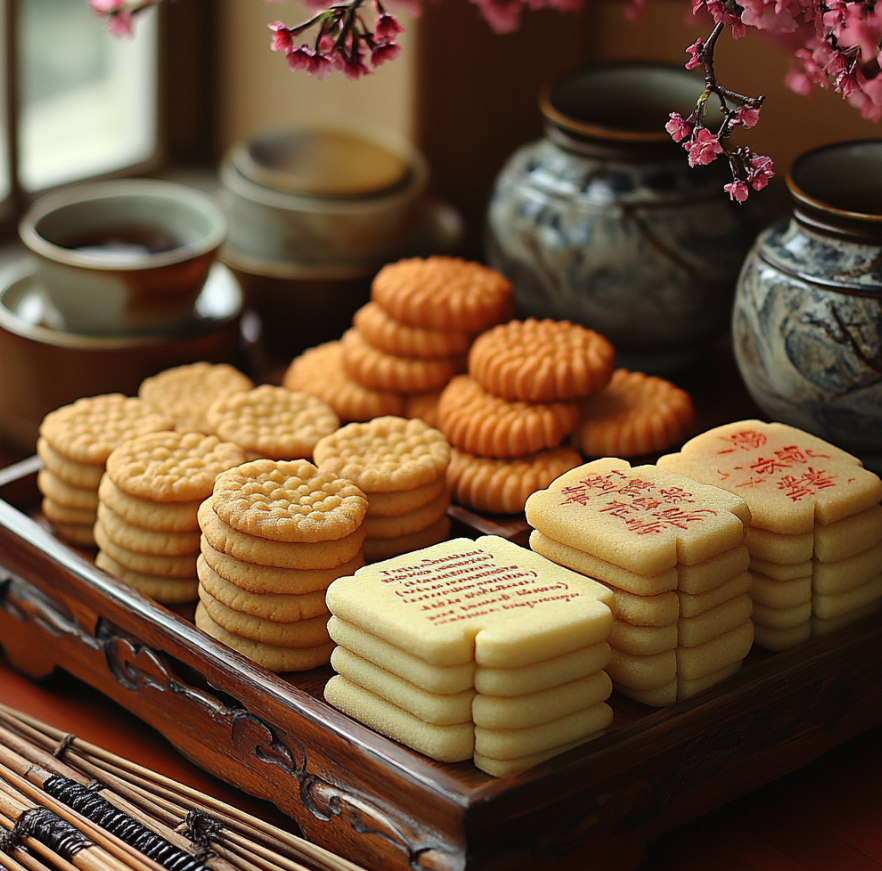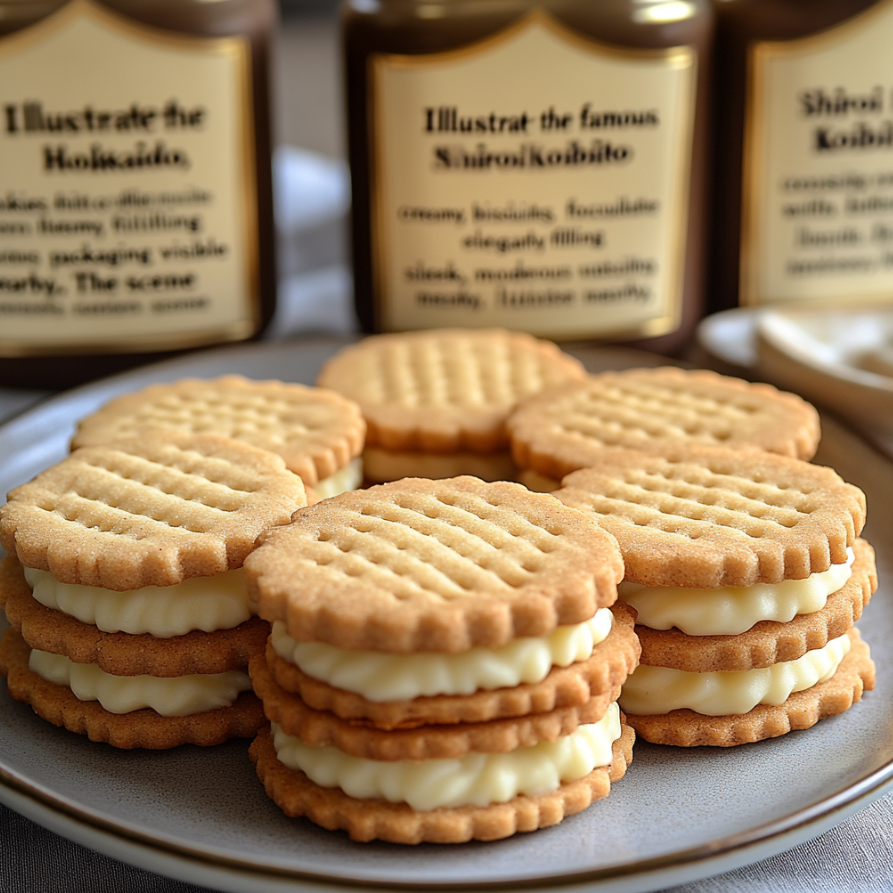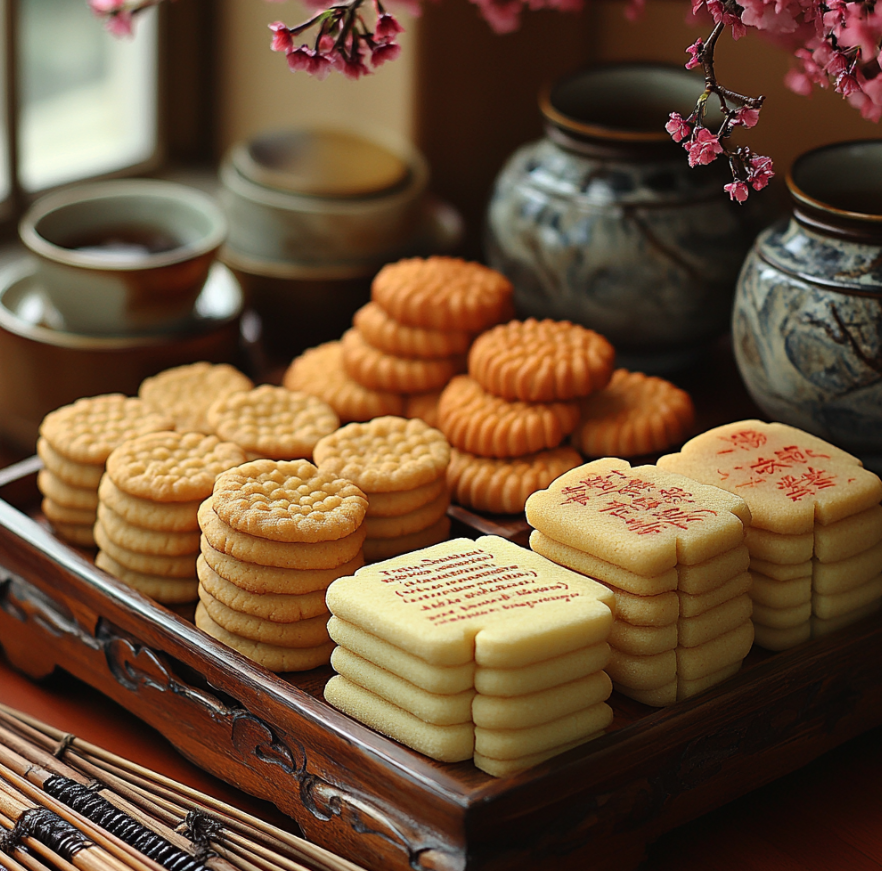Japan is a country known for its rich culinary traditions, and cookies are no exception. With a blend of traditional flavors and modern twists, Japanese cookies offer a delightful experience for anyone with a sweet tooth. Whether you’re a fan of buttery confections or prefer something with a bit more crunch, Japan has a cookie for you.
The Historical Evolution of Japanese Cookies
The evolution of Japanese cookies is a fascinating journey that intertwines with the country’s broader culinary history. Initially influenced by Chinese and Portuguese confectionery, Japanese sweets evolved over centuries, embracing local ingredients and unique flavors. Furthermore, the introduction of Western baking techniques in the 19th century further expanded the variety of cookies available, leading to the creation of distinct treats that blend both Eastern and Western culinary traditions.
For those interested in exploring more sweet delights, you might want to try making some Coconut Cookies, which share a rich flavor profile similar to some of the nutty, traditional Japanese cookies.
Traditional Japanese Cookies
Japan’s traditional cookies are often associated with cultural rituals and festivals, each offering a taste of history and tradition. Here are some of the most iconic traditional Japanese cookies:
Senbei (Rice Crackers)
Senbei are one of the most popular traditional Japanese cookies. These rice crackers are available in various shapes and flavors, from savory soy sauce to sweet varieties that are coated in sugar or wrapped in seaweed.
Hato Sabure (Dove-Shaped Butter Cookies)
Hato Sabure originates from Kamakura and are shaped like doves. These butter cookies have a rich, buttery flavor and are often given as gifts, symbolizing peace and goodwill.
Karinto (Deep-Fried Brown Sugar Cookies)
Karinto is a traditional sweet made from flour, yeast, and brown sugar, then deep-fried to create a crunchy texture. These cookies have a distinct sweet flavor that has been enjoyed by generations.
Manju (Steamed Sweet Buns with Filling)
Although Manju is not a cookie in the traditional sense, it is a steamed sweet bun often filled with red bean paste or other sweet fillings. It is a popular treat during festivals and special occasions.
For a similar texture, consider exploring the Banana Bread with Chocolate Chips, which offers a moist, sweet experience akin to the softness found in manju.

Modern Japanese Cookies
With the influence of Western baking, Japan has developed a variety of modern cookies that are beloved both domestically and internationally. Here are some of the top modern cookies you should try:
Shiroi Koibito (White Lover)
Shiroi Koibito is a famous souvenir cookie from Hokkaido. These delicate, langue de chat-style cookies are filled with white chocolate and are a must-try for anyone visiting Japan. The combination of buttery cookie and creamy white chocolate makes them irresistible.
Yoku Moku Cigare
Yoku Moku Cigare is another beloved Japanese cookie known for its rich, buttery flavor. These rolled cookies are light, crisp, and perfect for pairing with a cup of tea.
Matcha Cookies
Matcha cookies are a modern favorite, especially among the younger generation. Made with finely ground green tea powder, these cookies have a slightly bitter flavor balanced by the sweetness of the dough. They’re not only delicious but also offer the health benefits of matcha.
Kinako Sugar Cookies
Kinako sugar cookies are made from roasted soybean flour, giving them a unique nutty flavor. These cookies combine the traditional Japanese ingredient kinako with the sweetness of sugar, creating a delightful treat.
Mochi Cookies
Mochi cookies are a fusion of textures, combining the chewy consistency of mochi with the crispiness of traditional cookies. Often filled with flavors like red bean or matcha, these cookies offer a unique combination of textures and tastes that are distinctly Japanese.
For those who enjoy a blend of sweet and savory, you might find the Lemon Crinkle Cookies to be an interesting modern twist that parallels the delicate balance found in Japanese confections.

Top Japanese Cookie Brands
Japan is home to several renowned cookie brands that have become household names. Here are some of the most popular:
Ishiya Confectionery
Famous for its Shiroi Koibito cookies, Ishiya Confectionery is a staple in Hokkaido’s souvenir scene. Their cookies are loved for their quality ingredients and exquisite packaging, making them a popular gift.
Meiji
Meiji is one of Japan’s largest confectionery companies, offering a wide range of cookies, including the beloved Hello Panda and Kinoko No Yama. These cookies are known for their fun shapes and delicious fillings, making them a hit with both children and adults.
Fujiya
Fujiya is another iconic Japanese confectionery brand, known for its Milky and Country Ma’am cookies. These cookies have a soft, chewy texture and are available in various flavors, including chocolate chip and matcha.
How to Choose the Best Japanese Cookies
Selecting the best Japanese cookies depends on your personal preferences. Here are some tips to help you choose:
- Flavor Preferences: If you enjoy sweet flavors, consider cookies like Shiroi Koibito or Hato Sabure. On the other hand, for those who prefer something more savory, senbei might be the perfect choice.
- Texture: Consider whether you prefer a crispy cookie like Yoku Moku Cigare or something with a bit of chewiness like mochi cookies.
- Occasion: Some cookies, like Hato Sabure, make great gifts, while others, like matcha cookies, are perfect for enjoying with a cup of tea.
FAQs about Popular Japanese Cookies
What is the most popular cookie in Japan?
Shiroi Koibito is arguably the most popular cookie in Japan. This white chocolate-filled cookie from Hokkaido is a top souvenir and a favorite among both locals and tourists.
Are Japanese cookies healthier than Western cookies?
Japanese cookies often use natural ingredients like matcha, kinako, and red bean paste, which can make them a healthier option compared to some Western cookies that are higher in sugar and fat.
Where can I buy popular Japanese cookies online?
You can purchase popular Japanese cookies from various online retailers, including the Buy Japanese Cookies section of Japanese Taste, which offers a wide selection of both traditional and modern varieties.
What makes Japanese cookies unique?
Japanese cookies are unique due to their blend of traditional Japanese ingredients like matcha and kinako with Western baking techniques. This fusion results in cookies that are not only delicious but also culturally significant.
How are Japanese cookies typically enjoyed?
Japanese cookies are often enjoyed with tea, making them a popular choice for afternoon snacks or as part of a traditional tea ceremony. Additionally, they are also commonly given as gifts during holidays and special occasions.
Conclusion
In conclusion, Japanese cookies offer a delightful journey through Japan’s rich culinary landscape. From the crispy senbei to the buttery Shiroi Koibito, there’s a Japanese cookie to suit every taste. Whether you’re exploring these treats for the first time or revisiting old favorites, Japanese cookies are sure to leave a lasting impression. So why not try some today and experience the unique flavors of Japan’s cookie culture?

